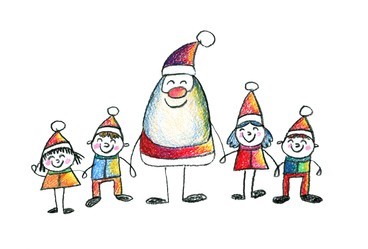
Most people immediately think of Santa when they hear the word "Christmas." In particular, many children in Korea hear the story that Santa brings gifts to good children who did not cry even if he or she had difficult and sad events. Then they often wait for gifts from Santa Claus on Christmas. Santa is a symbol of children's innocence, later memories, and gratitude. Many children believe in Santa's existence as a child, and only later realize that Santa does not exist as they grow up. At this time, some children even feel shocked and betrayed in the fact that Santa does not exist, and that their parents have deceived them for so long. However, even if a child felt shocked and betrayed as a child, will hearing the word "Santa" after becoming an adult bring to mind the feeling of betrayal? When adults hear the word Santa, many of them will think "I believed in Santa and was very happy when I received gifts from him. I was so pure back then,” rather than thinking “when I was young, my parents hid the fact that Santa didn't exist and deceived me. It's a really terrible memory." In general, when we hear the word "Santa" during adulthood, it reminds us of the innocence of childhood, past memories, and gratitude for parents who tried to protect our innocence rather than the feelings of betrayal. This is because as we become adults, we gradually understand our parents. In the process of growing up and understanding our parents, Santa’s existence becomes a memory of how our parents tried to protect the innocence of our childhood, not one of our parents ‘deception.’ In fact, according to the Segye Times in December 2018, Dr. Christine Dunfield, a developmental psychologist at the Concordia University in Canada, said, "Trust in illusionary beings such as Santa Claus is not harmful to real young children [...] Rather, it can have a positive effect when children themselves accept what is not true". It is that a perception of the "white lie" forms that parents told themselves was a good intention when they grow up. Eventually, memories related to Santa as children become a pathway for us to remember winter warmly. Also, when many people become adults, they share their childhood experiences related to Santa, talk, and sympathize with each other about Christmas. The innocence of childhood, which is difficult to have now as an adult, becomes a story to share and gives us a different kind of fun. Moreover, when children who believed in Santa become parents themselves, they tell the story of Santa Claus to their children and become “Santa” themselves to protect the child's innocence, recalling and understanding their parents once again. And Santa eventually forms a tradition between the generations of parents. There is no reason to step up and destroy the meaning of Santa. We should let children realize that there is no Santa naturally. This is because the Santa that we learn through the natural growth process will eventually last as the symbol of innocence, memories, and gratitude for us.

